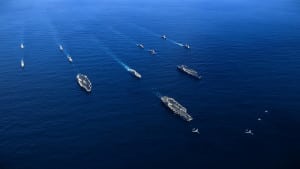Acting Secretary of the Navy Thomas Modly is commissioning a six-month study to examine the future of the aircraft carrier and carrier-based naval aviation in 2030 and beyond.
The Blue-Ribbon Future Carrier 2030 (FC-2030) Task Force will include Navy and Marine Corps leadership engagement, current and former members of Congress, leaders from the shipbuilding and technology industries, current and former Defense Department leaders, and thinkers from war colleges and think tanks, the Defense Department said in a press release. This effort was announced on March 9.

The announcement noted this task force will be complementary to and informed by a broad review of national shipbuilding requirements being conducted by Deputy Secretary of Defense David Norquist.
“Because we have four new Ford carriers under contract, we have some time to reimagine what comes next. Any assessment we do must consider cost, survivability, and the critical national requirement to sustain an industrial base that can produce the ships we need—ships that will contribute to a superior, integrated naval force for the 2030s and far beyond,” Modly reiterated in a statement.
He noted carrier construction sustains almost 60,000 jobs in over 46 states. “It can’t be simply turned on and off like a faucet. We must be thoughtful in how we approach changes as they will have lasting impacts on our national industrial competitiveness and employment,” he continued.
The study aims to provide the Secretary of the Navy with a report detailing the role of carrier-based naval aviation, manned and unmanned, within a vision of the future competitive global security environment. It is to consider principles of deterrence, global presence missions, protection of U.S. economic security, and potential combat with possible adversaries.
The announcement noted the study will also define likely constraints of means in relation to future defense budgets and “contemplate future possible technologies not yet invented that could change the stakes of carrier-based naval aviation in all phases of global competition.”
Ultimately, the report is to provide options for the Navy Department in requirements for different various future aircraft carriers to be used in future months and years in developing guidance to industry. This covers both manned and unmanned aircraft and nuclear and conventional carriers.
The Navy noted the study will also look at how to best use and evolve the existing carrier fleet “to meet the challenges of advanced long-range weapons that will extend and expand contested areas in the future.”
This effort is in line with what Modly has recently said about the future carrier force.
Speaking at the Center for Strategic and Budgetary Assessments in January, Modly noted current aircraft carriers are very expensive assets. The Ford-class carrier is “$13 billion apiece, and that’s not including the cost of the airwing and everything else. And it’s a big target and…it’s more vulnerable” (Defense Daily, Jan. 30).
At the time he said the Navy did not have a new CVN(X) program but would start looking at what CVN-82 will look like.
“Do we have to think about when we might layer that into the acquisition plan and the shipbuilding plan? Yes, we have to do all that. Does it have to be informed by how we’re thinking about this new surface fleet? Yes. The changing threat environment, all those things have to be considered. And that’s part of my job is to help cue up those types of questions because it’s not just a decision we make inside the Pentagon,” he added in January.
The FC-2030 Task Force will be led by an executive director from within the Department of the Navy’s Secretariat staff who will be assisted on a collateral-duty basis by representatives from the Office of Naval Research and Deputy Chief of Naval Operations for Warfighting Development.
The task force’s senior executive panel will also consist of former Sen. John Warner (R-Va.) as honorary chairman of the executive panel as well as former Secretary of the Navy John Lehman, former acting Deputy Secretary of Defense Christine Fox, former Deputy Undersecretary of the Navy Seth Cropsey, and former Rep. Randy Forbes (R-Va.) as executive members of the panel.
RC-2030 will be conducted with the assistance of the Naval University System and eligible Federally Funded Research and Development Centers and Naval Warfare Centers.
“Our future strength will be determined as much by the gray matter we apply to our challenges as the gray hulls we build. We need the best minds from both inside and outside of government focused on this issue,” Modly said.